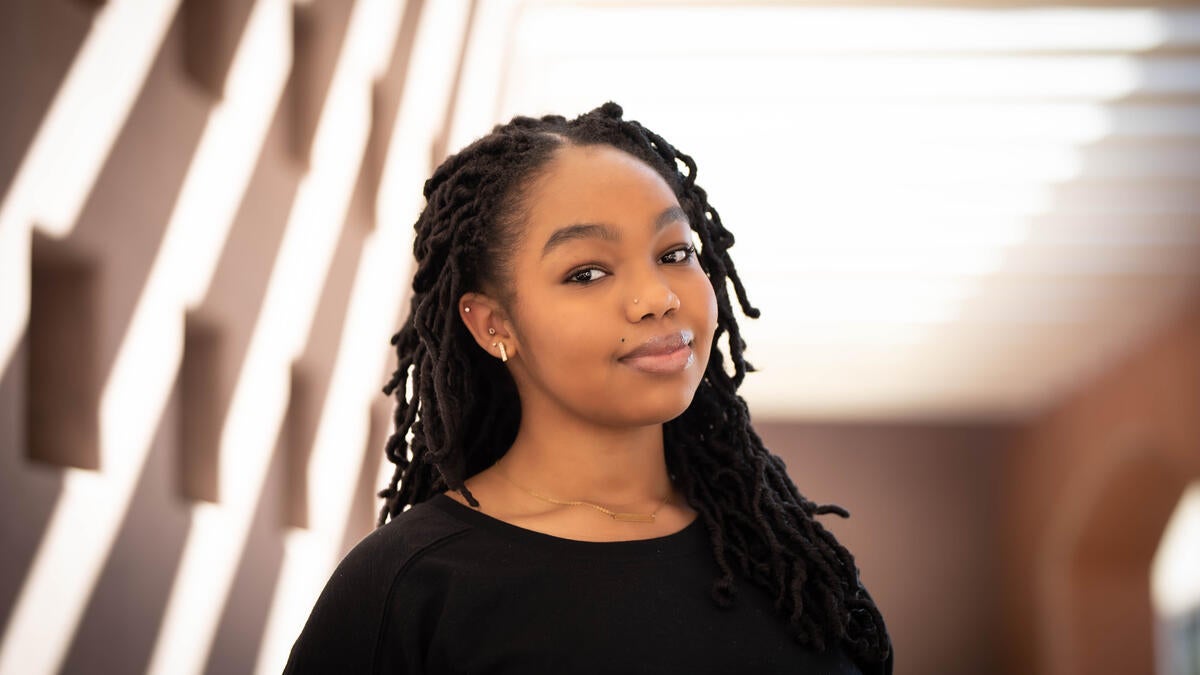ASU theater students honor Black History Month with one-woman show

ASU sophomore Ashley Anne Njoki Harris. Photo by Crestcencia Ortiz-Barnett
Crestcencia Ortiz-Barnett knew she wanted to do something for Black History Month, but she wasn’t sure what.
Then, the Arizona State University Master of Fine Arts in theatre (directing) student read “NEAT,” a play written by Tony Award-nominee Charlayne Woodard, and knew she wanted to direct it.
“I could not get it out of my head,” she said. “It’s very powerful.”
Ortiz-Barnett is directing the play at ASU for a class project. As an Afro-Latina woman, Ortiz-Barnett said she related to the coming-of-age story and the questions it poses about identity.
“Sometimes I was ashamed of being different,” she said. “I just identified with this story so much, and to Charlayne’s experience growing up — wanting to know more about herself and where she comes from.”
“NEAT” tells the life story of Woodard’s aunt and how her life was shaped by bigotry. The show was originally produced by the Manhattan Theatre Club in 1997 with Woodard playing the main role — although "role" is a bit of a misnomer. “NEAT” is a one-woman show that features 28 characters.
As director, Ortiz-Barnett said she knew that finding an ASU student who could play the role was a monumental task, but she felt ASU sophomore Ashley Anne Njoki Harris could handle it. Njoki Harris jumped at the chance.
“I was really surprised when I even got the opportunity to do this,” said Njoki Harris, “but I'm extremely grateful.”
This will be Njoki Harris’ third production with ASU’s School of Music, Dance and Theatre. She is a communications major pursuing a minor in theater.
“Each day I've had a new challenge for her, and she's always up for it,” Ortiz-Barnett said. “She takes direction and gives you versatility, she's eager to learn, and she works extremely hard.”
Njoki Harris said playing all of the characters in the show has been very demanding.
“The hardest thing is really finding different characteristics to show how all of (the characters) are different,” she said, “and to help the audience distinguish between them, because the show moves extremely fast.”
Bill Partlan, associate professor and artistic director for theater in the School of Music, Dance and Theatre, said he is proud of Ortiz-Barnett’s efforts.
“I’m thrilled that she has created this opportunity for the ASU and Phoenix communities to celebrate Black History Month with a solo-performance work of theatrical importance, power and grace,” said Partlan.
Ortiz-Barnett said she hopes people leave the performance with a new perspective.
“Ms. Woodard takes us on a beautiful coming-of-age story that explores innocence, heartache, a search for Black history, her own history, her first love, belongingness and how it changed her whole life,” Ortiz-Barnett said. “I hope audiences remember what it was like as a child and how they saw the world around them, versus how they see it now, and are able to ask themselves at the end of the performance, 'What's changed?’”
“NEAT” will be presented as part of a class project at 6:30 p.m. on Feb. 25 and 26 in the Nelson Fine Arts Center Studio 133. The event is free and open to the public. Reservations for the show are recommended. Audiences can reserve their seats at na.eventscloud.com/asuneat22. Please note: The show contains strong thematic content and language.
More Arts, humanities and education

ASU’s Humanities Institute announces 2024 book award winner
Arizona State University’s Humanities Institute (HI) has announced “The Long Land War: The Global Struggle for…

Retired admiral who spent decades in public service pursuing a degree in social work at ASU
Editor’s note: This story is part of coverage of ASU’s annual Salute to Service.Cari Thomas wore the uniform of the U.S. Coast…

Finding strength in tradition
Growing up in urban environments presents unique struggles for American Indian families. In these crowded and hectic spaces,…